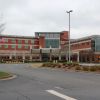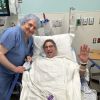How to Recognize the Signs of a Heart Attack in Men
Heart attacks are a leading cause of death in the United States, and they can affect anyone, regardless of age or gender. However, understanding the symptoms and being aware of the warning signs is crucial, especially for men, who may experience heart attacks differently than women. In this article, I’ll share my personal experience and knowledge on how to recognize the signs of a heart attack in men, so you can take action when needed.

1. Chest Pain or Discomfort
Chest pain is the most common symptom of a heart attack in men. It can feel like a pressure, squeezing, or tightness in the chest, and it may be accompanied by a sense of fullness. The pain may come on suddenly and last for several minutes, or it may go away and return. It's important to recognize that the pain can vary in intensity, and not every person will experience severe chest pain. Some might feel mild discomfort, so it's crucial to pay attention to any unusual sensations in the chest.
Atlanta Heart Specialists
atlanta heart specialists
4375 Johns Creek Pkwy #350, Suwanee, GA 30024, USA

2. Pain Radiating to the Upper Body
Another common symptom of a heart attack is pain that radiates to other parts of the body, such as the arms, shoulders, neck, jaw, or back. This can happen even if the chest pain itself is not extremely painful. Men, in particular, may experience pain that radiates down their left arm. It’s important to remember that the pain can vary, and in some cases, it may only affect one side of the body.
3. Shortness of Breath
If you or someone else is having trouble breathing, it could be a sign of a heart attack. Shortness of breath often occurs along with chest pain or discomfort. In some cases, shortness of breath may be the only symptom of a heart attack. This is why it’s important to stay alert to any sudden difficulty in breathing, especially if it is accompanied by other signs such as chest tightness.
4. Sweating and Cold Clammy Skin
Excessive sweating, or “cold sweats,” is another common symptom of a heart attack in men. This sweating is often described as a feeling of cold, clammy skin, even if the person is not in a warm environment. It can happen suddenly and may be accompanied by nausea or dizziness. If you notice this sign along with other symptoms, it could be a serious warning.
5. Nausea, Lightheadedness, or Dizziness
Nausea and lightheadedness are often overlooked symptoms of a heart attack. Men may experience a feeling of unease, dizziness, or an upset stomach, which could be mistaken for something less serious. However, if these symptoms occur with chest pain or shortness of breath, it is essential to seek medical attention immediately.
6. Fatigue or Feeling Weak
Feeling unusually tired or weak, especially if it comes on suddenly and without an obvious cause, can be a sign of a heart attack. This symptom is more common in the hours or days leading up to the actual heart attack. It is important to listen to your body and not dismiss any persistent fatigue, as it can be a red flag for a cardiovascular event.
7. Indigestion or Heartburn
Some men experience what feels like indigestion or heartburn during a heart attack. It may be mistaken for a digestive issue, and this can lead to delayed medical attention. If you experience this along with chest pain or other heart attack symptoms, it’s essential to get help immediately, as it may be indicative of a heart attack.
What Should You Do if You Suspect a Heart Attack?
If you or someone around you exhibits any of these symptoms, it is vital to take immediate action. Do not wait for the symptoms to worsen or go away. Call 911 or your emergency services right away. Prompt medical treatment can save lives, and time is crucial in preventing further damage to the heart. Try to stay calm and, if possible, chew an aspirin, as it may help thin the blood and reduce the severity of the attack.
Recognizing the signs of a heart attack in men can be life-saving. It’s important to be aware of your health and seek immediate help if you experience any of these symptoms. If you have any concerns or want to discuss your risk factors, consult with your healthcare provider to develop a plan to maintain heart health.





















Deborah Heart and Lung Center
deborah heart and lung center
200 Trenton Rd, Browns Mills, NJ 08015, USA